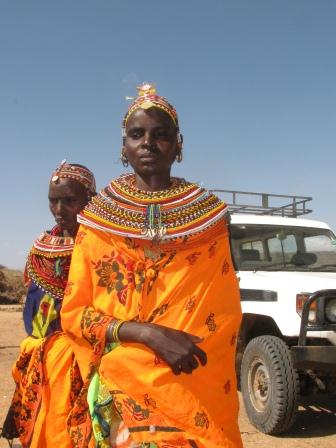David duChemin and his assistant, Corwin Herbert, are traveling with us in order to document our work, and the conditions of the pastoralists in northern Kenya. Our journey begins at 6 am with a transfer from Nairobi, a quick stop in Nanyuki to pick up the Gumpsmobile, Semeji (BOMA’s security man) and Maina (our mechanic). I will be driving the Gumpsmobile again, and we will meet Kura with the Defender in the north. We make two quick stops in Isiolo – filling up on petrol and a stop at a friends’ house where Semeji picks up his gun and dons his security uniform. Leaving Isiolo, Semeji takes the front passenger seat, our security man on duty. The drive, as always, is hot and dusty but we make good time and arrive in Laisamis village at 3 pm. Kura meet us at the security checkpoint.
The women at the campsite make us a lunch of stew, potatoes and cabbage, and after a short meeting and an even shorter nap, we go back to town to photograph some of our beading group businesses in the late afternoon sun. David gets wonderful shots of the women at work, their long slender fingers stringing beads that are intricately woven into beautiful necklaces and bangles. The main customers are travelers who ride the lorries, some from as far away as the Ethiopian border towns. Two military officers man the checkpoint, checking the lorries for refugees and guns. Kura hires one of them to help manage the crowd that gathers when they see us, including a sizeable group of drunk men. By the time we are finished, our two vehicles are surrounded with people asking for money.
The next morning we are off at 6 in order to reach Ndikir, a 20 minute drive. Gear and people are now divided between two vehicles and as we reach the villages, people are just starting to wake up.
Every visit to Laisamis District would not be complete without a visit with Malawan, the group leader of a BOMA business that sells food, clothing and beads. I have written about Malawan in previous posts http://bomafund.wordpress.com/2010/11/15/the-hermetic-cocoon-of-the-isolated-tourist/ and she reluctantly cooperates with us as David captures her portrait and the interactions with her children and business partners. It does not take long for David to capture what is so special about Malawan. Proud, arrogant and sometimes defiant – David tries to get Malawan to dip her chin. She is not accustomed to looking down.
You cannot show up in these villages and start taking photographs. People are distrustful of cameras; it took me many visits before people were comfortable enough with my presence so that I could take photographs. As we finish up, I explain to David and Corwin that in Rendille, when you ask someone if you can take their photograph the words are literally translated to, “May I take from you your shadow?”
Our intent is not to take their shadow. Our intent is to use David’s photos to tell the story of people like Malawan.

